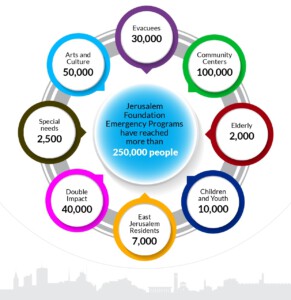As the War Continues, government agencies are slowly catching up, but it is still civil society that leads the way in responding to imminent needs, thanks to its inherent ability to be flexible and adapt programming and protocol in accordance with changing needs. With the help of friends in Israel and around the world, the Jerusalem Foundation continues to expand its emergency fund, created at the outbreak of the widespread tragedy, supporting the network of community organizations and agencies across Jerusalem, with a focus on those most affected by the disastrous events: Jerusalem’s most vulnerable residents who are even more at risk in this difficult time, Jerusalem families of the bereaved and the injured, essential workers in the city, and of course, evacuees and war refugees currently residing here.
As of the end of November, we have raised millions of dollars for the emergency fund, thanks to the generous and meaningful support of our friends around the world. By partnering with some 100 community and culture institutions, we have reached tens of thousands of people across the city, including many of the 30,000 refugees residing in 37 hotels in Jerusalem, and we continue our work to reach more and more people facing serious challenges. We are assessing the continually evolving needs and adapting our responses to provide for the most urgent and relevant issues, while also thinking about the day after and taking care of a long list of arts and culture institutions that are facing huge challenges.
A major portion of our emergency response has been through the neighborhood community centers across Jerusalem. The Foundation partnered with 17 community centers in every corner of the city. With our help, community centers have been able to provide a range of services, focusing on the most vulnerable populations within the communities: the elderly, people with special needs, people with mental illnesses, new immigrants without family support and families of those in military reserve duty.
With the continuing, and initial trauma of October 7 and the war that has followed, many young people are facing new and continuing mental health struggles. In partnership with the Ein Yael Nature Therapy Center, we have continued to provide nature therapy for survivors of the Nova Music Festival attack and youth at risk.
While on the one hand, food security for many Jerusalem families is not guaranteed, especially due to the ongoing emergency situation, 15 tons of fresh produce are wasted at the Jerusalem Wholesale Market weekly. The Jerusalem Food Rescuers already save 3 tons a week, yet in the face of the crisis are seeking to triple their work in order to reach the growing circle of local Jerusalem families in need as well as providing for evacuees.
Our largest project in the emergency response continues to be the Double Impact project.
The main idea of Double Impact is to create a new system of formal and informal education at many institutions and sites in Jerusalem that have large spaces. These spaces serve as locations for innovative education and for much needed recreation and play. Jerusalem is blessed with an abundance of Israel’s most important sites and institutions, yet many of them are facing serious financial crisis due to the war as they had to close their doors. At the same time, evacuees staying in hotels and local children need some time outside and respite from stress. You can read more about the already huge successes of the Double Impact program here.
These and so many other projects have been made possible by our generous friends from around the world who have been so concerned for the people of Jerusalem and all of Israel. We thank you for your ongoing support and hope that as we go into the new year, we will see many changes, including an end to this crisis period and a beginning of the work to rebuild and repair as we look towards the day after.

